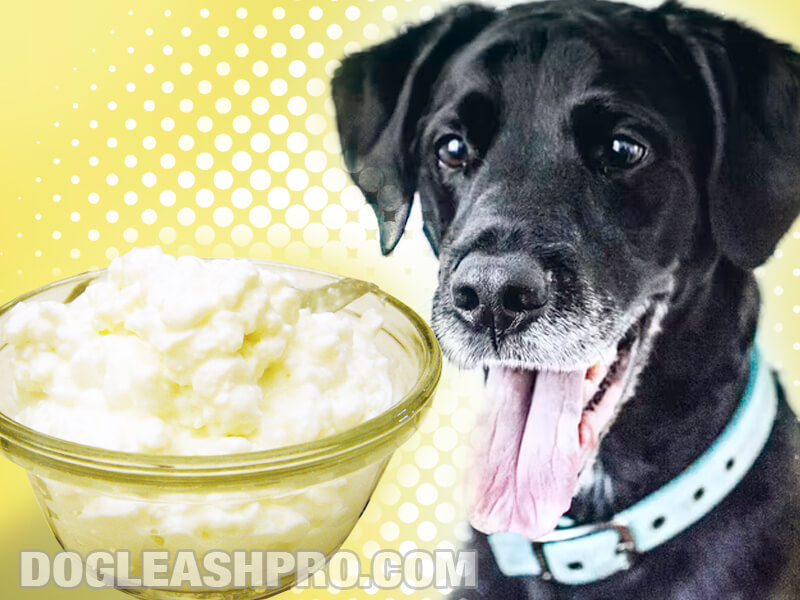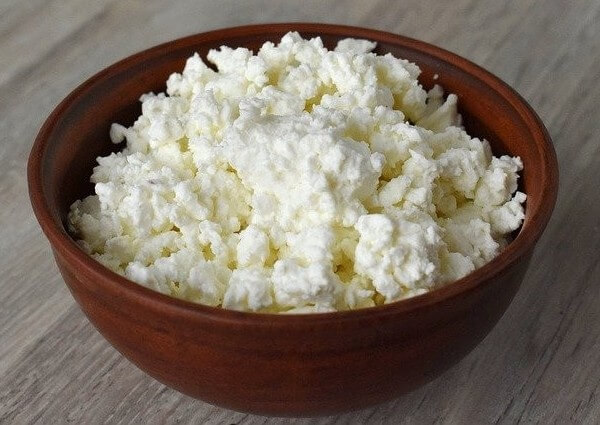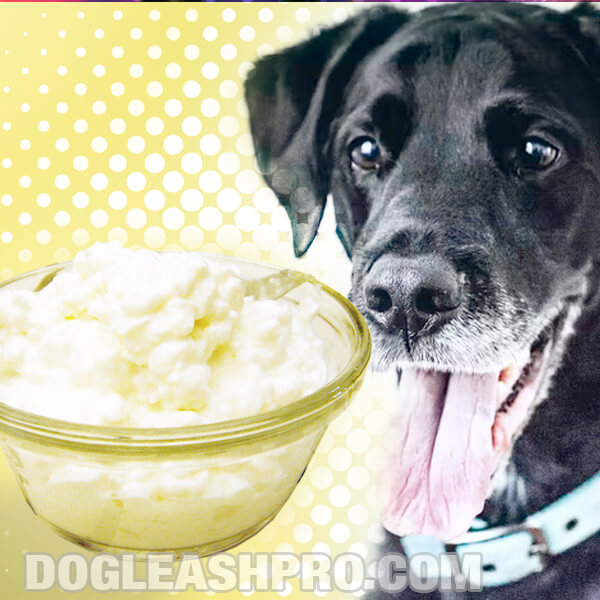
As I was making Cottage Cheese pancakes for breakfast, I accidentally dropped some onto my kitchen counter. Before I could even clean up the mess, my Labrador had already licked the Cottage Cheese off the counter. Luckily, it was just a small amount but it got me wondering, “Can I feed my dog Cottage Cheese? Is Cottage Cheese safe for dogs?” Here’s the quick answer first.
Can dogs eat Cottage Cheese? Yes, dogs can eat Cottage Cheese in moderation if they can tolerate dairy and cheese products. Dogs that are not lactose intolerant can enjoy Cottage Cheese as it is nutritious and is sometimes recommended for canines with digestive issues. If your dogs are lactose intolerant, avoid feeding them Cottage Cheese.
In this guide, we’ll discuss everything you need to know about dogs and Cottage Cheese, including how it can benefit your dogs’ health if they can tolerate Cottage Cheese, how much Cottage Cheese to give a dog, and can Cottage Cheese help dogs gain weight. Let’s begin!
Table of Contents
Can dogs have Cottage Cheese?

Yes, dogs can have Cottage Cheese if they are not lactose intolerant, meaning they can tolerate dairy products like milk and cheese.
Let’s go over what Cottage Cheese is as well as its ingredients and nutritional profile.
What is Cottage Cheese?
Cottage Cheese is small fresh cheese curds that have a creamy yet light savory taste. While small curds are most common, today Cottage Cheese can also have medium or large curds as well.
To make Cottage Cheese, the milk is acidified through bacterial fermentation or when manufacturers add vinegar or lemon juice to the milk. This allows the curds to separate from the whey and it gives the milk that tart taste.
After the curds are fully formed, they go through a rinsing process, and later some salt is added. Unlike other cheese products that go through an aging process, Cottage Cheese is best enjoyed fresh with its retained moisture and some whey.
You might also like: Can Dogs Eat Cream Cheese?
Nutritional benefits of Cottage Cheese
Cottage Cheese is packed full of vitamins and minerals and a great source of protein. Here is a list of vitamins and minerals you can expect to find in Cottage Cheese:
- B-complex vitamins, including vitamin B12.
- Calcium.
- Protein and casein protein.
- Probiotics.
- Magnesium.
In the next section, we’ll go over in detail how these vitamins and minerals can help benefit your canine friend’s health.
Is Cottage Cheese good for dogs?
Yes, Cottage Cheese is good for dogs in moderation. However, make sure your dogs are not lactose intolerant so that they can enjoy this nutritious treat and receive the full health benefits without getting an upset stomach or other types of gastrointestinal upset.
There are several health benefits that Cottage Cheese provides to dogs.
Cottage Cheese contains vitamin B12 which supports a healthy nervous system and spinal health in dogs
Since dogs aren’t able to naturally produce vitamin B12 in their body, they rely on eating healthy food to receive this essential vitamin. Vitamin B12 is also known as cobalamin and it can help your dogs with the following:
- Boost immunity. Dogs that receive vitamin B12 will have a strong immune system and overall health.
- Supports healthy nervous system. Since vitamin B12 produces a fatty tissue called myelin which helps to protect and coat nerves. With enough myelin, your dogs will have a healthy nervous system and brain function. A healthy nervous system means good spinal health.
- Assists in burning carbs and fat. Vitamin B12 helps to break down carbs, fats, and proteins properly so that the nutrients can be absorbed by the body. Note that calories are comprised of three essential macronutrients: proteins, carbs, and fats.
- Aids in cell growth. Not only does vitamin B12 help with cell growth, but it is also vital for producing red blood cells. Having a healthy red blood cell count means your dogs are healthy and energetic.
- Improves your dogs’ appetite and they will be able to absorb more nutrients from their food.
- Encourages healthy guts in dogs. With sufficient vitamin B12 intake, your dogs will have a healthy balance of good and bad bacteria in their guts and this prevents gastrointestinal disorders.
- Protect against diseases and illness. Vitamin B12 also helps to combat illnesses relating to the digestive system and pancreas.
Calcium from Cottage Cheese facilitate proper bone development in dogs
While we are aware that calcium promotes strong and healthy bones and teeth in dogs, this mineral also plays a crucial role in other aspects of our dog’s health as well.
That’s because 99% of the calcium found in your pups’ bodies is stored in their bones and 1% of the calcium is found in their muscle, blood, and other essential tissues.
With sufficient calcium intake, your canine friends’ bodies are able to effectively perform important daily functions. Calcium not only helps to regulate your dog’s nervous functions and heart rhythms, but it also helps your dog’s blood to clot and allows his or her muscles to contract.
Your dog’s body is constantly working to keep a consistent amount of calcium in both the tissues and in the blood.
However, can Cottage Cheese be bad for dogs? Yes, it can and we’ll discuss this next.
Fun Fact: Scallops also contain calcium, magnesium, and a list of other nutrients, but are they safe for doggy consumption? Check out Can Dogs Eat Scallops? to find out!
Is Cottage Cheese bad for dogs?
Yes, Cottage Cheese can be bad for dogs since most Cottage Cheese brands you’ll find in your local grocery store or supermarket may contain high levels of sodium and even sugar.
When dogs consume too much salt from food high in sodium, they may get hypernatremia, which is when they have too much salt in their blood. This can cause their muscles to become stiff or even shrivel from losing moisture. As a result, your pooch may start to jerk and shake.
It’s important to note that too much sodium consumption can also lead to salt poisoning in dogs. Signs and symptoms of sodium poisoning in dogs include:
- Very thirsty.
- Frequent urination.
- Convulsions.
- Confusion.
- Headache.
- Fluid buildup.
- Swollen tongue.
- Fever or high body temperature.
- Tachycardia or fast heart rate.
- Loss of appetite.
- Nausea.
- Vomiting.
- Upset stomach.
- Watery and loose diarrhea.
- Abdominal pain.
- Lack of energy.
- Muscle spasms.
- Body weakness.
- Difficulty breathing or respiratory distress.
- Seizures (in severe cases).
- Coma (in severe cases).
Sometimes, dogs with salt poisoning may look like they are walking around like they’re intoxicated. If you notice changes in your dog’s behavior, you’ll want to contact the veterinarian as soon as you can.
Salt poisoning requires immediate medical attention and the sooner your furry friends receive proper diagnosis and treatment, the better. Your vet may perform a series of thorough tests to confirm whether your pooch has salt poisoning before administering treatments like electrolytes and IV therapy fluids.
RELATED: My Dog Is Acting Drunk And Wobbly – Should I Be Concerned?
With that, if you plan on feeding your pooch a small amount of Cottage Cheese, make sure you choose Cottage Cheese that has no added salt, reduced sodium, or no added sugar.
DISCLAIMER: THIS WEBSITE DOES NOT PROVIDE MEDICAL ADVICE
The information, including but not limited to, text, graphics, images and other material contained on this website are for informational purposes only. No material on this site is intended to be a substitute for professional veterinary advice, diagnosis, or treatment. Always seek the advice of your veterinarian or other qualified health care provider with any questions you may have regarding dietary needs.
Resources:
https://en.wikipedia.org/wiki/Cottage_cheese

With over five years of specialized experience as an animal writer, my expertise lies in dog nutrition, health, behavior, grooming, and training. I am dedicated to delivering helpful and informative content that caters to the well-being of our furry friends. My primary goal is to empower pet owners with knowledge and ensure our canine companions thrive in health and happiness. In my free time, I love volunteering at local dog rescue centers.







